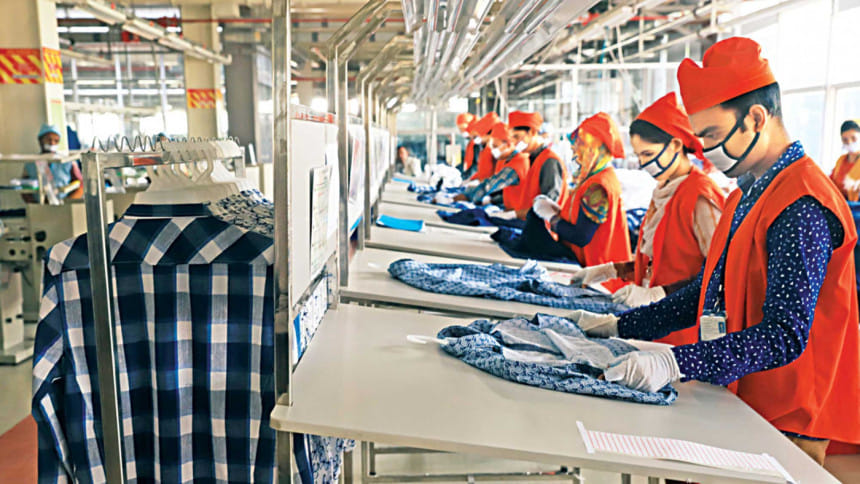We must keep an eye out for Pakistan

Recently, I read that Pakistan, a major competitor of Bangladesh in garment and textile production, had hit record textile exports. The country posted an uptick in textile exports year-on-year of 40 percent in FY2021-22 to the level of USD 21 billion.
Pakistan's economic advisers are now suggesting that this figure will expand to USD 26 billion in the next fiscal year, and place the country's textile exports well beyond its pre-pandemic levels. What is driving this increase, and should Bangladesh be concerned?
There are several issues to consider here. Pakistan is targeting the same export markets as we are—namely the US and the EU, plus the UK. I saw someone on social media recently comparing Bangladesh, Pakistan and India in terms of garment exports, and suggesting that Pakistan had been the clear leader during the pandemic.
There is a reason for this. Factories in Pakistan reopened ahead of Bangladesh and India after the pandemic first emerged in early 2020, and they were able to draw orders from global fashion brands when our factories were closed. Some orders shifted to Pakistan from us and India. That said, in the latter half of 2021, Bangladesh's RMG sector rebounded strongly and ended the year with the strongest quarter on record.
However, I think we should all be careful about reading too much into export performances during the pandemic, given that we were operating in exceptional times, the likes of which we may never see again. For this reason, I would argue that we need to wait until the back end of 2022, when I expect the dust to finally start to settle on the pandemic, to assess where we are in terms of our competitors, and whether Pakistan's record exports are a sign of things to come. By the same token, we will not know for some time whether the extra business Bangladesh won during the latter half of 2021 is here to stay.
Bangladesh does have a slight competitive advantage over its neighbour. Firstly, we remain ahead of Pakistan when it comes to issues such as compliance and safety. Our garment factories have invested millions of dollars in these areas, and it will take a while for our competitors in Pakistan to catch up. That said, Pakistan does boast a modern textile factory. Like Bangladesh, compliance is more of an issue when one goes beyond large, Tier 1 factories.
The second area is the broader issue of sustainability. It has taken a while, but I am finally seeing more and more RMG factories in Bangladesh embracing sustainability, recognising it for the genuine business opportunity that it is. Indeed, it is a prerequisite of doing business with modern fashion retailers. I don't think Pakistan is as far along its sustainability journey as Bangladesh, but again, it does boast some excellent success stories. Denim production is one, where it is a world leader in sustainability. Pakistan's huge organic cotton sector is another.
The third area is marketing and modernisation. Bangladesh's RMG sector gets many more column inches in the international media than Pakistan—and India, for that matter. There is a huge interest in our RMG sector, and for this our industry leaders, including the BGMEA, must be given due credit. We are an open, outward-facing sector, and this has helped us win trust and credibility in the international fashion industry.
Finally, there is the subject of safety. For many years, sourcing executives were concerned about visiting Pakistan due to the lingering issues of terrorism. While these issues are now greatly reduced, it is only natural that executives will still tread carefully. The rebuilding process for Pakistan will take time, but we should all support it along this important journey.
Having said all that, if we ignore Pakistan's strengths, we will do so at our own peril.
What are these strengths? One is its access to raw materials, with Pakistan being one of the world's largest cotton growers. Also, with a well-run deep seaport and privatised airport operations, Pakistan is well-placed to meet stringent delivery targets from customers. I was pleased to see the recent launch of a direct shipping connection between Chittagong and Ravenna, Italy, with a sailing time of just 16 days. It is precisely these logistics investments that we need to make Bangladesh more attractive to buyers.
There is another way of looking at this issue. Instead of viewing Pakistan as a threat, we should see ourselves as regional partners. Both the countries could capitalise on their regional strength—especially in the current global political climate. Pakistan may be a competitor, but there is no doubt in my mind that together we will be stronger.
Mostafiz Uddin is Managing Director of Denim Expert Limited, and Founder and CEO of Bangladesh Apparel Exchange (BAE) and Bangladesh Denim Expo.

 For all latest news, follow The Daily Star's Google News channel.
For all latest news, follow The Daily Star's Google News channel. 



Comments